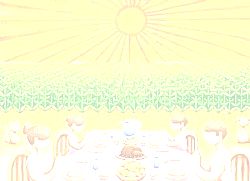1 I said in my mind, Come now, I will prove you with mirth and test you with pleasure; so have a good time [enjoy pleasure]. But this also was vanity (emptiness, falsity, and futility)!
2 I said of laughter, It is mad, and of pleasure, What does it accomplish?
3 I searched in my mind how to cheer my body with wine—yet at the same time having my mind hold its course and guide me with [human] wisdom—and how to lay hold of folly, till I might see what was good for the sons of men to do under heaven all the days of their lives.
4 I made great works; I built myself houses, I planted vineyards.
5 I made for myself gardens and orchards and I planted in them all kinds of fruit trees.
6 I made for myself pools of water from which to water the forest and make the trees bud.
7 I bought menservants and maidservants and had servants born in my house. Also I had great possessions of herds and flocks, more than any who had been before me in Jerusalem.
8 I also gathered for myself silver and gold and the treasure of kings and of the provinces. I got for myself men singers and women singers, and the delights of the sons of men—[a]concubines very many.
9 So I became great and increased more than all who were before me in Jerusalem. Also my wisdom remained with me and stood by me.
10 And whatever my eyes desired I kept not from them; I withheld not my heart from any pleasure, for my heart rejoiced in all my labor, and this was my portion and reward for all my toil.
11 Then I looked on all that my hands had done and the labor I had spent in doing it, and behold, all was vanity and a striving after the wind and a feeding on it, and there was no profit under the sun.
12 So I turned to consider [human] wisdom and madness and folly; for what can the man do who succeeds the king? Nothing but what has been done already.
13 Then I saw that even [human] wisdom [that brings sorrow] is better than [the pleasures of] folly as far as light is better than darkness.
14 The wise man’s eyes are in his head, but the fool walks in darkness; and yet I perceived that [in the end] one event happens to them both.
15 Then said I in my heart, As it happens to the fool, so it will happen even to me. And of what use is it then for me to be more wise? Then I said in my heart, This also is vanity (emptiness, vainglory, and futility)!
16 For of the wise man, the same as of the fool, there is no permanent remembrance, since in the days to come all will be long forgotten. And how does the wise man die? Even as the fool!
17 So I hated life, because what is done under the sun was grievous to me; for all is vanity and a striving after the wind and a feeding on it.
18 And I hated all my labor in which I had toiled under the sun, seeing that I must leave it to the man who will succeed me.
19 And who knows whether he will be a wise man or a fool? Yet he will have dominion over all my labor in which I have toiled and in which I have shown myself wise under the sun. This is also vanity (emptiness, falsity, and futility)!
20 So I turned around and gave my heart up to despair over all the labor of my efforts under the sun.
21 For here is a man whose labor is with wisdom and knowledge and skill; yet to a man who has not toiled for it he must leave it all as his portion. This also is vanity (emptiness, falsity, and futility) and a great evil!
22 For what has a man left from all his labor and from the striving and vexation of his heart in which he has toiled under the sun?
23 For all his days are but pain and sorrow, and his work is a vexation and grief; his mind takes no rest even at night. This is also vanity (emptiness, falsity, and futility)!
24 There is nothing better for a man than that he should eat and drink and make himself enjoy good in his labor. Even this, I have seen, is from the hand of God.
25 For who can eat or who can have enjoyment any more than I can—[b]apart from Him?
26 For to the person who pleases Him God gives wisdom and knowledge and joy; but to the sinner He gives the work of gathering and heaping up, that he may give to one who pleases God. This also is vanity and a striving after the wind and a feeding on it.
Footnotes:
a.Ecclesiastes 2:8 Solomon’s reign began under most promising conditions: he “loved the Lord, walking in the statutes of David his father... All Israel... feared the king [Solomon], for they saw that the wisdom of God was in him, to do judgment” (I Kings 3:3, 28 kjv). But soon his own “wisdom” alone was guiding him. He openly affronted God by taking many wives, including even heathen women. They seduced him into tolerating and even practicing idolatry (I Kings 11:1ff.).
b.Ecclesiastes 2:25 According to The Septuagint (Greek translation of the Old Testament) and The Syriac reading: Jesus recognized the unprecedented glory which Solomon’s human wisdom had brought him, but He said that Solomon arrayed in all of it was not equal in glory to one tiny lily of the field—which God’s wisdom had made (Matt. 6:29).

